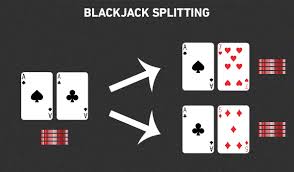If you are still confused about the split any where rules in blackjack, then read on to have a better understanding of this. Split a or w any card dealing situation is allowed in blackjack, whether it it is played face up or dealt face down. You can also opt for it to be dealt face up or dealt face down, but however you have to indicate to the dealer that you want to do it. It is usually used to have a card count in blackjack, and is more commonly used nowadays because players can see the cards of other players. Casinos with live dealers also use small sized counters that are placed in front of the players to keep an eye on it. But, what about online blackjack? Well, virtually every online blackjack website allows the player to split any number of cards. The nominal value of the cards when split is the number of points, i.e. 2 is worth 2, 3 is worth 3, 4 is worth 4 and so on. But, it should be noted that in some cases the cards are not worth such a ratio and are actually worth half point, such as 6 is worth 6 and 5 is worth 5. This value is indicated on the card by the letter s$ which stands for one dollar. So, you could actually double up your bet two times for a dollar at the same time.
Split any number of cards is the basic blackjack strategy and this is the first thing that you should learn as well. However, there are different kinds of situations when you may want to use this strategy. In fact, this basic blackjack strategy is quite useful when counting cards in blackjack. The counting cards strategy is normally used when the dealer has a 6 or below in the hole. When the hole card has a value of 5 or 6, this is considered to be soft 17. Thus, with this strategy, you can always have the additional advantage of seeing your card before the dealer shows his.
When the blackjack table is set with a double down or when the house edge is at least 0.50%, this basic blackjack strategy can even be used. It is a highly advisable strategy to use if you are betting on the banker’s hand, but you can also bet on the player’s hand. When the house edge is at least 0.40% on the player’s hand, this strategy can actually prove to be profitable for you, provided that you can play doubling down when the house edge is at least 0.20% on the banker’s hand.
Some casinos will actually allow the player to take insurance if the dealer has an Ace as kicker. This is another blackjack strategy that shouldn’t really be used in cases where the dealer has a 9 as kicker, since an Ace is still a card valued as 11 in the deck, which means that the dealer will have to draw one more card after busting and he cannot beat you with another card in hand. Unless you have a very strong hand, probably you will not be able to bet enough for the house to get a good advantage.
Be sure that you understand the different blackjack strategies before trying any of them out for yourself. Some of these strategies are the Slow Play, which is the most passive of all the strategies, the Speed Bet, which is typically quick but the house edge goes up every time, the Marry Hand, which is the combination of a hard and soft hand, the Hit and Run, defeating the dealer without the need to draw, and the Surrender, where the debts are already paid in full.
Blackjack is a game of mathematical statistics. Knowing the perfect strategy to use will statistically give you the house edge in the game. The house edge is the amount you give to the casino when you play blackjack. The house edge is usually the result of the individual games played in a casino. Let’s say that the casino has a house edge of 0.5%. This means that for every 100 hands played in the casino, the house will only win 50 of those hands. Consequently, the player will only lose 40 hands as compared to 100 hands in the same scenario. Mathematicalationally speaking, for every 1,000 hands, the house will only win or lose 80, whereas the other 100 hands show a net profit of 40 hands. As it is impossible to measure the profitability of a game like blackjack mathematically, you will have to trust your experience and intuition while playing. The casino will always have an edge over the players in the long term.
Mathematically speaking, players lose in the long term when the number of hands they draw is less than the number of hands that the dealer does not draw. On the other hand, the dealer has to stay in the game in the long term when he has a greater chance of losing than winning.
